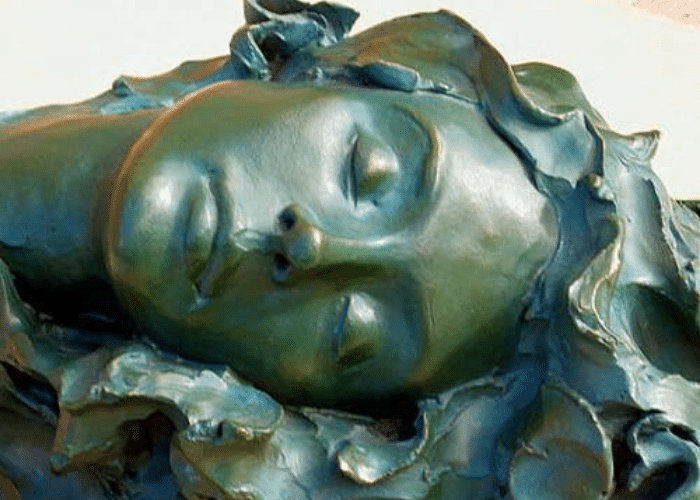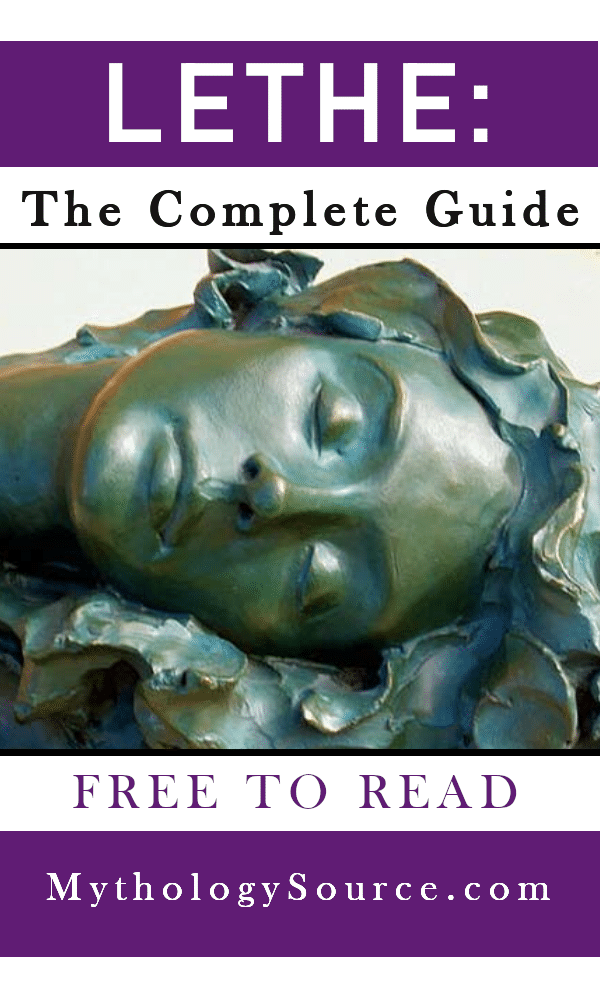
Greek
Lethe: The Spirit and River of Forgetfulness
Lethe: The Spirit and River of Forgetfulness
Wait, what is this page about? Oh right! Today we are talking all about Lethe, the sense of forgetfulness in Greek mythology!
The word lethe in ancient Greek is usually translated as “forgetfulness.” Its meaning, however, was much more exact than simple moments of thoughtlessness that are common to us all.
Lethe meant not just the forgetting of a single fact or event, but a complete loss of all memory and the concealment of truth.
Lethe was embodied in mythology by not one, but two figures. Often confused for one another, the goddess Lethe and the River Lethe both had the power to bring about forgetfulness on both large and small scales.
Lethe, particularly the river, was so powerful that it could make you forget yourself, your life, and even your understanding of the world around you.
Keep reading and hopefully you will remember everything about Lethe in Greek mythology!
The Meaning of “Lethe”
The Greek word lethe has many approximate translations in modern English. These include “oblivion,” “concealment,” or “forgetfulness.”
Most English translators use the last of these as the standard meaning for the word, especially as it was used in mythology. The other definitions are important, however, for understanding the full impact of lethe.
The word was related to aletheia, which meant “truth.” The prefix –a, however, more properly makes this word the exact opposite of its root, lethe.
Truth was thus an opposite of oblivion or concealment. It was “un-forgetfulness,” or “un-concealment.” The opposite of truth was not a lie, it was a concealment or erasure.
Lethe, therefore, did not just refer to the forgetting of certain facts or events. It meant the concealment or negation of truth itself.
Lethe went beyond absentmindedness. It was the loss of fundamental truths about oneself, the world, and the natural order.
The Greeks viewed truth as one of the most important principles in life. It dictated their laws, religion, and social norms.
Without truth, Greek life was meaningless. Lethe, the absence of truth, could have serious consequences on a large enough scale.
The Personification of Forgetting
Like many abstract ideas in the Greek world, lethe was personified as a minor goddess. The daimona, or spirit, Lethe was not just the goddess of forgetfulness, she was the state of mind itself.
The daimones had no real characterization beyond the role they played. Lethe had no mythology, known loves, or conflicts – she simply existed as the embodiment of a state of being.
This minor goddess was named among the offspring of Eris, the personification of strife. Like most of the children of Eris, she was seen as hateful and abhorrent.
Her siblings included Ponos (Toil), Ate (Ruin), and Limos (Starvation). The personifications of murder and lies were among the family of Eris.
Like most of the despised children of Eris, Lethe was rarely prayed to or invoked in hymns.
In fact, it was often taboo to even say the names of these deities. It was hoped that by never mentioning them, people could avoid attracting their unwanted attention.
In short, the Greeks hoped that Lethe would, herself, forget all about them.
The River Lethe
There was another use of the name Lethe, however. In addition to the goddess, it could also refer to a place.
The River Lethe was one of the five waterways of the underworld. It flowed through the realm of Hades, among the souls of the dead.
The Lethe was more than just an underworld landmark, however. As its name suggested, the waters of the river had the power to make a soul forget everything it once knew.
The Greek underworld was a dismal place. The souls of the dead wandered without purpose, the vast majority receiving neither punishment nor reward after they had died.
The realm of Hades was a place of shadow and mist, populated by souls with no direction. To make things even more bleak, many ancient writers believed that the souls of the dead were made to drink from the waters of the River Lethe.
The water made them forget everything about their former life. The souls were truly lost, not even remembering their own identities.
The few mortals who entered the realm of Hades also had to be wary of the River Lethe. Drinking from it, or even touching its surface, could trap them in the underworld forever.
The idea of forgetting one’s life and self was so closely identified with death that poets used the River Lethe as a metaphor for the underworld in general. The realm of the dead was defined by forgetfulness and, in the full meaning of the word lethe, the loss of the truths known in life.
The river could touch the living as well even if they were far from it. In its course it wound around the cave of Hypnos (Sleep), causing the forgetful oblivion of drowsiness.
The sound of the river lulled people while Hypnos, the brother of Thanatos (Death) came to them in the night.
As time went on, the Greek view of the afterlife changed. No longer was every soul doomed to wander without an identity for all eternity.
The Elysium Fields emerged as a more pleasant and happy afterlife for those who were truly deserving of reward. The River Lethe formed the boundary between Elysium and the rest of the underworld, ensuring that no unworthy souls could wander into a more comfortable existence.
As could be expected given their shared name, the goddess Lethe and the River Lethe were often confused for one another. The river was sometimes described as having its own nymph to personify it, who took on the same role as the daimone born to Eris.
The Waters of the Underworld
The Lethe one of five rivers that flowed through the realm of Hades. Each had its own role in the land of the dead.
- The River Styx – This river separated the lands of the living and the dead. It was also personified by an ancient river goddess.
- The River Phlegethon – The river of fire, it coiled around the earth before emptying its hot fires into the depths of Tartarus.
- The River Cocytus – Meaning “lamentation,” this river encircled the underworld.
- The River Acheron – The river or sorrow or woe, it was described as the primary waterway that flowed through the realm. It was said that Acheron was once the son of Helios who was punished for providing water to the Titans during their war with the gods of Mount Olympus.
It was a common belief that when a soul reached the underworld it was ferried into the realm of the dead by Charon. While modern readers often identify the river Charon worked on as the Styx, the Greeks actually believed it was the Acheron that one crossed by ferry.
The Styx was important in its own way, though. It could grant invulnerability and it was said to have been the river Achilles was dipped in as a child to make him almost entirely immortal.
The rivers of the underworld were said to converge in its center, forming a great swampland that encompassed much of the realm.
Lethe and the Oracles
While forgetfulness and oblivion were unwelcome by the Greeks, there were also times when they were seen as potentially beneficial.
Lethe and her counterpart, Mnemosyne, played an important role at certain oracle sites, Working together, it was believed that they could reveal truths that could not ordinarily be seen.
Whether the oracles in Boeotia worked under the influence of the goddess Lethe or the river is unclear at best. Mnemosyne is typically recognized as one of the Titan goddesses, but a description of the oracle’s working said that the petitioner drank from the waters of each.
It is possible that two springs or streams near the site of the oracle were given the names in the belief that they provided a link to the underworld.
A person first drank from the waters of Lethe, forgetting their current concerns and preoccupations. Mnemosyne, the goddess of memory, then entered their mind.
The process could be said to work in much the same way as certain types of meditation. By clearing the mind, the petitioner could see greater truths in his or her memories and perhaps even understand the future.
Some mystery cults seemed to have believed that rivers of both Lethe and Mnemosyne existed in the afterlife. By choosing to drink of Mnemosyne one could retain one’s mental facilities and learn a great deal in the realm of Hades.
Ameles Potamos
The River Lethe was also called Ameles potamos, or the river of unmindfulness. Later philosophers believed that, with self-control and care, it was possible to control how the water affected the mind.
They believed that the water of the Lethe wore away at the mind. By drinking only a little, being mindful of one’s consumption, one could mitigate the water’s effects.
Plato described the journey into the underworld as a trek across a vast plain. As one crossed, it was necessary to drink a certain amount from the River Lethe.
Those who were wise drank only a small amount so that they retained most of their memories, and thus their sense of self, in the afterlife. The foolish, however, took great draughts of the water and completely forget everything about themselves by the time they crossed the plains.
Only by drinking the water, however, could one be reincarnated. The idea of reincarnation had some following throughout Greek history, but in later eras it became especially popular.
Some philosophers believed that a soul could not be reincarnated and retain all its past memories. By drinking wisely from the River Lethe, however, the soul might retain some of its knowledge or skills in the next life.
This retention was especially true for those seeking entrance to the Isles of the Blessed. Only by reaching Elysium through three consecutive reincarnations could one achieve true bliss on the immortal islands, so any amount of retained wisdom would be helpful in that pursuit.
Lethe and Forgetfulness
In conclusion, the word lethe is generally translated as “forgetfulness” in modern English. In Greek, however, it contained deeper meanings of oblivion, concealment, and the loss of truth.
Lethe was both a goddess and place in Greek mythology, although there was a great deal of overlap between the two.
The goddess Lethe was a personification of the idea. One of the children of Eris, the goddess of strife, she was almost universally seen as a negative influence in life.
The other Lethe was one of the five rivers of the underworld. Its water had the power to induce forgetfulness, to the point that souls who drank from it lost all memories of life and sense of self.
The river and the goddess were often conflated. Often, both were seen in the form of a river nymph.
Lethe could be beneficial in certain contexts, however. In the tradition of the oracles of Boeotia, the combination of water from Lethe and Mnemosyne, who was also believed by some mystery cults to be a river as well as a goddess, could induce a trance-like state in which higher truths could be revealed by wiping the mind clean of preoccupations.
It was later believed that souls could choose to drink less of the water, retaining some of their memories in the afterlife. As belief in reincarnation grew, this meant that some souls could return with skills or wisdom they had learned in another lifetime.




